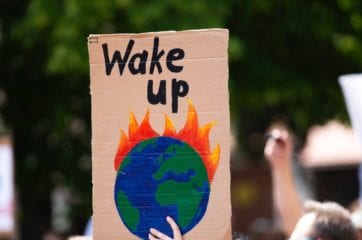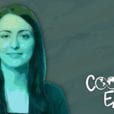Mathew Goldberg, PhD, Yale Program on Climate Change Communication
Insights into human psychology have provided the climate movement with a wealth of information about how people interpret, process, and behave in regards to messaging and communication strategies. Matthew Goldberg has built his career on understanding the complexities of the human psyche and the role that social influence and ideology play in shaping individual beliefs, specifically as it relates to climate change.
In this episode, we talk with Dr. Mathew Goldberg about his work at Yale’s Program on Climate Change Communication, his research on message persuasion and fossil fuel money in politics; and his insight into how we can better integrate knowledge of human psychology to strengthen support for climate action.
Below is a transcript of the podcast, edited and trimmed for clarity and brevity.

Maria Virginia Olano (MVO): Thank you so much for joining us and making the time to be here today.

Mathew Goldberg, PhD (MG): Thanks for having me.

MVO: Remind me, where are you based right now?

MG: I’m in New Haven, right by Yale and right off campus. Doing alright with the COVID restrictions and more students around, but I’m not really going anywhere so I’m working from home most of the time.

MVO: That’s such a beautiful area. I had a friend go there so I’ve been there a few times and it’s so beautiful, especially this time of year. But I’m glad you’ve been able to work, that’s a relief.

MG: For sure. How are things going for you where you’re based?

MVO: I live in Boston, but I’m currently up in Vermont with my in-laws. We came here a few months ago to try and get out of the city for a little. Still working from home, but enjoying a lot more space and nature which has been lovely.
A little bit of background behind the podcast, this is our fourth season now. We actually had one of your colleagues on season three last year, John Kotcher, so he joined us on the podcast. A lot has been focused around the social science aspect and what we’ve gotten wrong on how we communicate the climate crisis and what we can learn to do better going forward — so you’re our perfect guest and I’m very excited.
Do you want to start by telling us about your background and how you got into this field initially?
Listen to our podcast episode with John Kotcher, a Research Assistant Professor at George Mason University’s Center for Climate Change Communication, here.

MG: Absolutely. My background is in social psychology. Going way back to high school or potentially earlier, my whole life was sports. I was playing football and wrestling, and my main interest in psychology was basically built on my desire to compete well and get the most out of my training, and to be able to anticipate my opponents. That was my initial interest in motivation and human psychology. As I got deeper into school and once I got to college, I started to hone in on specific topic areas, and I started to shop around within psychology. I knew I wanted to get a PhD, but I wasn’t sure exactly what I wanted to study. Then I at least decided on the subfield, which was social psychology. I was interested in persuasion, social influence, conformity, and stuff like that. That led me to my PhD at the CUNY Graduate Center at the City University of New York, and that’s where I started to look at persuasion, and more specifically resistance to persuasion and what people do to get around accepting strong evidence against their deeply held beliefs. I was interested in that from an applied standpoint, but especially the theoretical implications, what methods people use to resist persuasion and why that matters for how we communicate.
As I got later into my graduate career, I was thinking more about the ‘so what’ question. Why do we do all this research? Why should I spend my life’s work on this? That’s where I started at Yale in 2018, where I was starting to zoom in on the application part of this research. Given one of the most pressing issues of our time, climate change, it seemed like a natural match, where my expertise and my research on resistance and persuasion was especially important for looking at how to engage people with this issue. So I went through my postdoc for the past 2 years and recently, in June 2020, I started my faculty position here at the Yale School of the Environment, and the rest is history.

MVO: Congratulations. I am a huge fan of the work Yale is doing around this issue and I think it’s really pioneered that the very idea and the crucial point that we really need to understand is the social science and behavioral aspect to this issue as well. I think many of us in the field have historically understood climate as an issue for natural sciences. The natural scientists are so way ahead, we know so much about the causes, the consequences, the projections about how climate change is happening and what we can expect. Then the other side of that understanding that this is going to have to come from a deep, societal, personal mindset change is what is really exciting to see happening now. Can you tell us a little about the research you’re currently working on and what you’re most excited about?

MG: We’ve been focusing on a bunch of different subjects within the climate and clean energy space. One of the main questions that has been preoccupying me for the past few months I plan to spend the coming years on. We have a good idea of the persuasive effects of our messaging, but there is much less known on what leads to enduring change. So of course, it is important to move people in the moment, but if it doesn’t stick then that creates other issues for us. We want to be able to create this enduring change, because the problem is certainly not getting better without substantive action. So I’ve been thinking a lot about what kinds of messaging and approaches lead to enduring change. We’re finding some really interesting things but there’s still so much unknown there. But that’s probably the frontier of the open questions in this area that I’m most interested in.

MVO: Definitely. And for people who might not be familiar with how this research is conducted, can you tell us behind your research methods and even how you go about tackling some of these large, large questions?

MG: At the Yale Program on Climate Change Communications (YPCCC), we use a variety of methods, we’re a very interdisciplinary group. Much of our work is centered around the Climate Change in the American Mind project, which is a twice per year nationally representative survey that the center has been doing since 2008. The most recent one was this past April and it sets the stage for a lot of what we do because it informs the current state of affairs in the U.S.
Learn more about YPCCC here.
What percentage believe climate change is happening and is human caused? What percentage is worried about it? Which policies do they support? And so on. We look at the political differences and other demographics differences, so that’s a wealth of knowledge we can always draw from. We take that information, along with other information from our greater environment, and do experimental tests, or randomized controlled experiments. We manipulate parts of a message, whether it be specific wording or an emphasis on particular values to match an audience or a specific messenger. We try to optimize how to best communicate to various segments of the American public, whether it be based on politics, gender, their diet preferences — there are a lot of ways for us to split up the American public. What we’re trying to do is we’re trying to gain insights on how to keep moving the needle forward to increase people’s personal beliefs that are more pro climate, and ultimately the policies they support and how they vote.
Find the latest reports and information from YPCCC’s “Climate Change in the American Mind” here.

MVO: It’s invaluable research and such a wealth of information. One of the things that I personally refer back to a lot is the Global Warming’s Six Americas, and the way that the center has divided the American mind not just into a binary of ‘do you believe in climate change or not,’ ‘do you support climate action or not,’ but the truth is a lot more nuanced. In that vein — because I think it’s a huge misconception that people hold, that it’s 50/50 you believe or don’t believe — what are some of the things that you’ve found the most surprising or that you wish more people would know in the research you’ve done?
Alarmed, Concerned, Cautious, Disengaged, Doubtful, Dismissive — learn more about Global Warming’s Six Americas here.

MG: The biggest contribution in that space, or at least the most surprising given what is covered in this research space, is that people across the ideological and partisanship spectrum are all moveable. Speaking of Global Warming Six Americas, people that are doubtful or dismissive are still very moveable on climate, it’s just that we’re speaking to different audiences. A big misconception is that it’s perfectly split across partisanship lines — all Democrats are pro-climate and all Republicans are anti-climate — but there is so much variability, especially within the Republican party. There are lots of Americans that vote Republican, but at the same time say that climate change is an important issue to them, that they find it personally important and that they’re worried about it. Those folks are moveable, they’re a segment of the population that we can engage, and hopefully it becomes more normatively salient that there are people across the spectrum that care about this issue and want to take substantive action.

MVO: This is where I get stuck. The data shows that there are a lot of Republicans who care about this issue and continue to vote Republican. Have you given any further thought about, in application, if these findings mean that people are more likely to move away from the party or that the party will move to embrace climate solutions?

MG: I think the answer is largely unknown as to whether people will resolve the tension by moving away from the party or the party will be more pro-climate. There are some hints at it. The divide in the Republican party across age lines is an important one. Younger Republicans are more significantly more likely to care about climate change and want action on the issue. That could be foreshadowing for where the Republican party is going and I really hope that’s the case. A big one is that while there are a lot of Republicans who care about the issue and are worried about it, it’s not something that they vote on.
Looking at our most recent Climate Change in the American Mind survey, we can see among liberal Democrats that global warming is the second most important voting issue, and among moderate and conservative Democrats it ranks 9th. For all types of Republicans, it doesn’t even come close to the top ten. There might be a lot of Republicans who care about it, but it’s not something that they’re voting on because at the moment at least, other issues outweigh it.

MVO: On this idea and finding that people can in fact change their minds, you’ve written extensively about the role of individual relationships and friends and family becoming messengers and communicators of this issue to hopefully be able to sway, persuade, or move certain people to care about the issue.
Can you tell us a little bit about that, and how you’ve seen it change or actually play out?

MG: Some of this is inherently difficult to study because it’s hard to experimentally manipulate what people’s friends and family members think about the issue, but we can certainly get very close in understanding how people differ based on what their friends and family members think. We’ve published a bunch of work on this where we can see that there are massive differences between liberals and conservatives, or Republicans and Democrats, on the issue of climate when it comes to whether it’s happening, human-caused, worry, policy support, just across the board. But once we select among people who have friends and family that care about the issue, that partisan ideological gap is substantially smaller, and on some questions totally eliminated. You can see that there are Republicans and conservative Republicans even that care a lot about the issue, and that is among those who have friends and family that also care about it.
Ideally, we’re headed towards being able to encourage people to talk to their friends and family about the issue, where we can precisely measure that causal effect of people speaking up. There are a lot of good reasons to believe it would be effective. Close friends and family members are typically more influential in general than a stranger or a singing advertisement or something like that. I think there is a lot of promising work that would suggest that that approach will be effective, but I think a little bit more work needs to be done to understand just how scalable and that big of an impact you can have.

MVO: Especially because, unfortunately, climate has become one of those issues that is kind of lumped in with the ‘political issues that you’re not meant to talk about with family or at the dinner table’ because it’s seen as contentious. We’re recording this on the week of the latest confirmation hearings for the Supreme Court justice and we saw that, right? We saw somebody respond that climate change is in fact a matter of public debate and public discourse. It’s fascinating and interesting.
What would be some tangible advice or ways for people listening who want to start having these conversations, but either don’t know how to or want to learn what could be the most effective based on who they’re speaking to?

MG: I think there’s a lot that we can pull from in the literature, especially on social psychology and political science, that speaks to these persuasive techniques and just being able to have an open, non-judgmental conversation. Even though there isn’t a lot of experimental work on this space in terms of climate, we can learn from a lot of other studies that a few general points hold.
Being a good listener is crucial, being non-combative, being just generally open and starting with a shared goal, especially if it’s simple and easy to agree with. Anyone could agree with the idea that we shouldn’t trash the only place we can live. Very simple and straightforward and starting with that point of agreement is key. Sometimes, depending on the specific ways that the other side might be misinformed on the issue can be helpful, so you can affirm some of those misconceptions before trying to convince away from them.
Katharine Hayhoe is fantastic at this. A lot of people say ‘the climate has always been changing’ so therefore it’s just a natural phenomenon. And the way that she starts is by affirming that belief that the climate has changed a lot throughout history, but this time it’s much different. So it’s a way to acknowledge someone’s belief or stance on something before pivoting away from it. It’s a way to reduce defensiveness because you’re affirming something that someone else values or a belief that they currently hold. You don’t want to open up with a direct contradiction but rather take it in stride and be able to have more of an open non-judgmental conversation.

MVO: Her TED talk is absolutely brilliant. Something I was thinking a lot about when preparing for this interview was the difference between the conversations we’re having with people who are straight up denying the fact that climate change is human caused and a result of burning fossil fuels, versus the much larger group of people who understand that it’s a problem and that it’s man-made, and yet are not engaged in solutions yet or are contentious or hesitant about certain policy solutions.
How do you and the center square these two things? And where do you think your priorities for your research lie?
Watch Dr. Katharine Hayhoe’s TED talk, “The most important thing you ca do to fight climate change: talk about it,” here.

MG: You have a lot of people that are averse to specific policy solutions. If you could imagine a stereotypical and anti-big government group within the political right, you can see that there would be a natural resistance to things like carbon taxes and other approaches like that. But often people aren’t getting into the nitty-gritty policy details, so I think that often elite queues play a bigger role than specific policy wordings and such. Which does matter, but often not as big as when people look around you know they identify with certain folks around them and certain elected officials, and they often follow their lead. I think raising the profile of elected officials, Republican elected officials especially, to be able to signal that they are pro-climate, that they’re willing to take action on this issue. But of course this leaves out the important issue with the interest groups that will often punish elected officials by funding their primary challenger or something like that. It’s definitely not without risk, but I think we do need more conservative voices that are going to speak up on this because again the conversation should be about how do we best solve this problem not whether or not it is a problem.

MVO: We’ve definitely moved towards that direction, and the folks who outright deny that this is an issue continues to shrink. You have research published on the very specific issue you touched on, which is the ongoing influence of fossil fuel interests and the funding towards politicians and ends up having this disproportionate representation in elected officials who continue to take these stances that are perhaps not representative of the wider populations stances.
Can you share some of the findings from that study and why you think it’s important to take that into account in the conversation?

MG: There’s no doubt that interest groups have an enormous influence on climate politics. In our work, we are interested in the more straightforward question of the kind of strategy that oil and gas companies are taking and who they donate to, which kinds of candidates they donate to, and we pose this question of influence versus investment. In the case of influence, you could imagine an elected official getting a lot of contributions and then voting more against environmental legislation later. The flip side would be investment, where elected officials get into office and a vote consistently against the environment kind of as a signal and then these companies invest in them later. Kind of like a ‘prove it’ strategy, where a certain elected official proves themselves and the more that they do that and they show that in real substance through their votes in Congress are in the Senate, they end up getting more campaign contributions later. Our study pulled that timing apart showing that when legislators vote more against environmental legislation, they end up getting more campaign contributions later. We can see now that over time — our data was from 1990 to 2018 — we can see that that proportion of money used to go I think was like 60/40 or something in favor of Republicans and now it’s closer to 80/20 or 90/10, so much more of that is going through republicans because over time, we become more polarizing that that middle is kind of disappeared.
“Oil and gas companies invest in legislators that vote against the environment” — read Dr. Goldberg’s research on fossil fuel investments in politicians here.

MVO: Its findings are really shocking, both in how much they’ve increased and then how direct the relationship is between negative votes on environmental policy and actual funding of contributions. I think that might somehow be a good finding, in the sense that voters, if we’re able, to pay more attention and be more engaged on how representatives are voting during their term and then vote against that once their term is up. That may be a positive thing that those in favor of climate action can also start seeing and acting on, not necessarily in campaign contributions, but in terms of actual voting and voting people out of office who don’t represent the interests of the people.

MG: For sure, and I hope it’s increasingly the case where we can strengthen our democracy enough to be able to hold elected officials to account based on the way that they voted while in office. I figured there’s no other way that’s as good as that, where it’s like ‘hey, if you’re not going to represent us then we will vote you out.’ We’ll see if that ends up being the case over the next several years but I certainly hope that the people make their power felt.

MVO: Absolutely, which brings us to talk about this year, which feels like it’s been five years all in one if not more. With the pandemic, economic crisis, and the calls for racial justice and the natural disasters — basically everything that’s been happening in the zeitgeist as most of us are at home and confined to our screens.
What, if any, have you seen in terms of both the shift in public opinion as they relate to climate, and how you’ve perceived their implications or impact on the ongoing election?

MG: A big one is what I was saying earlier where climate is increasingly becoming an issue people consider when they consider who to vote for. Just a quick look at this year’s primaries, looking at the climate proposals from then vs. just four years ago I think the difference is enormous. There is this pressure that if you’re not going to be aggressive with your climate plan, then we don’t want to hear from you on the Democratic side. Like I was saying, young Republicans are increasingly concerned about climate, and I hope that they move their party in the right direction on the issue. But, I think that the only way to get elected officials or candidates running for office to care about what people think on the issue is if people actually let it decide their vote, so we’re trying to make that happen. There are a lot of organizations doing great work on this, where they’re locating people that are better otherwise pro climate and in trying to get them to turn out. I think the more that we can do that the better and the stronger the coalition will be.

MVO: We actually had Nathaniel Stinnett from the Environmental Voter Project on the podcast just a few weeks ago speaking about this, and the need to mobilize people that already care about this issue so much and may otherwise sit out elections or not even exercise the right to vote.
The numbers are staggering — they make me so happy and hopeful to see how much this issue is becoming a central issue, even if at times that it’s because of horrifying events that people are experiencing more and more. One of the other things that has changed starkly since 2016 to now is the media. Media coverage both around the election, but also in general, in terms of how we’re making connections between the climate crisis and ongoing wildfires. We saw the term ‘climate change’ on the front page of the New York Times, Washington Post, and center stage at the Presidential Debates — which is shocking given how it went last time around.
I’m curious how your research, if at all, intersects with the media and how the media is also influencing, impacting, or diverging from popular opinion and beliefs around the climate crisis?
Catch up on our episode with Nathaniel Stinnett from the Environmental Voter Project, and Sara Singh from Sunrise Boston, here.

MG: The effect of media is so important, especially in just agenda-setting. Whether we end up talking about it or not and then how they cover it is huge for setting the stage on how the issue is framed. Over decades, the media was clinging to this false balanced narrative where ‘well, we need to give climate deniers an equal voice because we don’t want to come off as biased.’ We could see the consequences of that in the public response to it. If it seems like a debate, then people see it like it’s 50-50, when it’s really nowhere near 50/50. Just thinking about the scientific consensus, nearly 100% of climate scientists are screaming at the top of their lungs saying ‘It’s real. It’s bad. We need to do something now.’ I think that the media plays a huge role in that.
In speaking to our specific work, our research on the Green New Deal, we observed partisan polarization over four months that was just mind-blowing. Looking at when we’re barely anyone knew about what the Green New Deal was and we just described you know just it’s it’s basic components, Republicans and Democrats alike read that and then were like ‘wow, this sounds great.’ Then, a lot of top news outlets were hammering it endlessly. We saw that among Fox News viewers, they even stood out compared to other Republicans that don’t watch Fox News and we can see how influential media outlets like that are when they spend so much of their airtime bashing the Green New Deal. We could see that they even covered it more often than MSNBC and other major outlets like CNN. So we can see the power that kind of media has on public opinion.
Listen to a recent Cooler Earth episode with Dr. Genevieve Guenther on why we need to hold the media accountable when it comes to climate change and mistakes we make in climate communications, here.

MVO: It’s so stark, and there’s been so much research and a robust amount of insights into how, specifically cable news and most specifically Fox News, has had on persuading people. Especially people who just watch Fox News or fall into the trap of fear mongering around policies that might not even be as widely discussed or talked about.
From your perspective, what are some things that you wish or hoped that the media would be doing better, given your background and what you know about persuasion, human psychology, and everything we know about climate communication?

MG: I think the biggest one is using plain language. We could even see that happening in the debates in critiquing how Kamala Harris responded to Mike Pence in the vice presidential debates. There were a lot of opportunities to speak in plain language, but instead there were some cases where she spoke of carbon emissions and going net-zero where most people don’t know what that means. Staying away from the jargon that a lot of people in the climate movement are fully prepared to talk about, but that doesn’t describe most Americans. Using plain language is probably one of the most powerful tools in our toolbox, where it’s like ‘Hey, let’s stop polluting the planet. Let’s have clean air and water.’ It’s abundantly clear when you frame it that way.
Even just speaking to the enormous havoc that fossil fuels cause on human health, and that’s something that we’ve seen in our surveys that Americans are becoming increasingly aware of. I think that’s that’s due in part to so many practitioners really stepping their game up in framing this just a human rights thing and just a human health issue. By expanding the breadth of the issue and making it very relatable, you can have people read it and it really resonates with people rather than thinking about polar bears and ice melting, people instead think about the destruction of just their backyards and that is hitting really more close to home.

MVO: It’s so refreshing and so brilliant to see some of these people really leading on climate communications, getting right, and just resonating with people without the use of overly complicated and complex language that’s hard to engage with and also very hard to understand. The bottom line and the impact and consequences of the issue don’t need to be complicated or hard.
What are some of the things you’ve seen change the most since you began doing this research up until today in terms of the trends, the shifts and changes in perception around the climate issue?

MG: A big one is — and I don’t know what degree this is or compared to other things that have changed — but I think the acknowledgement that this is going to be a complex discussion. When it comes to policy, there’s going to have to be give and take, and also the desire to build coalitions. This discussion around who’s too far gone to be able to team up with versus you don’t want to alienate someone who is very close to you ideologically just because they just disagree with you a little bit. You see this a lot in the going from the 2016 election to now 2020, where you’re seeing folks like Joe Biden adopt a really aggressive climate plan. I think that’s changed dramatically where by so many definitions Biden is a centrist or on many scales, center-Right, at least outside the U.S. skew in thinking about this coalition-building. There are people, especially in the Democratic party, that are willing to write anyone off because of disagreements — sometimes major disagreements — but we shouldn’t alienate otherwise allies in this time and fight. I think being able to get a better sense of who might be beneficial as an ally is going to be key because ultimately this is about political power. Yes, the individual action is also crucial, but ultimately to solve this problem we’re going to need in a large-scale policy change.

MVO: Definitely. Something that we’ve talked about in the podcast this year a lot is the intersectionality of issues. So as you are saying build coalitions and reach across to see who we have aligned goals and incentives with, something that comes up a lot, as it should, is the intersectionality between racial justice and climate justice. In terms of the overlap of the folks who are on the frontlines and the receiving end of oppression in both instances, and also the need to change the mindset into how we view these as separate lanes. “I am working towards fixing the climate crisis”, or “I’m working for racial justice in America”, when in reality, that work is very much aligned in so many ways.
I am curious to hear from you how you perceive in terms of overlapping priorities or issue priorities versus a broader understanding of the intersectionality of these issues themselves?
Catch up on the latest season of Cooler Earth here.

MG: I think the intersectionality of the issue is essential. Because yes, there are large proportions of Americans that care about the issue of climate change passionately but it’s not the only issue at the top of their mind. So I think it is a smart move strategically, but also it shows greater awareness as to how intertwined climate issues are with issues of racial justice. For example, we know that the impacts are not evenly distributed; they are disproportionately in communities of color. To ignore that would be an injustice itself, and it would also be a strategic mishap as well, because to the extent that you can overlap people’s passion for one issue with another issue, you can better connect the coalitions and find more allies. I think there is so much opportunity to be able to embrace the intersectionality of the issue — it’s an economic problem, it’s a moral problem, it’s a religious problem, it’s a racial justice problem. To the extent that we can diversify those climate voices — and I think there have been fantastic efforts at doing that by a number of different organizations — I think the more that we do that, the more opportunities we have for people to identify with the issue.

MVO: Absolutely. It’s been brilliant to see that happen this year so much, both in terms of a huge reckoning within the environmental movement and understanding where the blind spots have been historically, and then also a larger call for systemic change more generally that addresses all the issues that we currently face. You mentioned your current research at the beginning of the interview, but I wanted to go back because I found it absolutely fascinating, meaning the leveraging social science to generate lasting engagement on climate.
I was wondering if you could tell us a bit more about how you distill these levers that you think we can pull on, on social norms and mental models to generate this lasting change that we need at the individual and community level?

MG: For this paper, it was a perspective piece, so it is myself and my two colleagues, Abel Gustafson and Sander van der Linden, trying to distill just some major points for us to focus on. This was by no means a fully comprehensive review of the literature, it’s just so massive. But, we did zoom in on those three pieces that we call deep engagement, general mental models, and social norms. I’ll go over each one.
For deep engagement, I think this is important to emphasize, because not all kinds of engagement are of the same depth. So if you think about scrolling past an advertisement on Facebook, that has been shown, and in many cases can be effective in influencing what people believe about climate and other issues. But, it is not as deep as having a conversation with a friend or family member or even a stranger knocking on your door. There is fantastic work on deep canvassing where people are knocking on doors trying to speak about important issues that are close to their hearts. So we review some of that research on deep canvassing where people engage in these non judgemental conversations and they are able to move people on issues that people normally expect are not that malleable, like people’s beliefs and feelings about transgender individuals or racial prejudice. It turns out that these interventions are really effective. So we put a lot of emphasis on this idea of deep engagement because we don’t want to overlook the fact that a lot of interventions focus on just one-shot deals, and we want to think more for the long game because ultimately that’s what this issue is. If we’re going to make progress, we can’t afford to lose it, so this focus on enduring change is important.
Moving to general mental models, this is based on the idea of grand narratives, that there are just certain ideas that stick around and that tend to be barriers long-term, and they can be applied pretty broadly. There are a bunch that we point to in the paper, but one that I think has been especially harmful is that there is this myth of environment versus economy tradeoff. If people walk around with this general idea of the intersection between economic prosperity and the environment as being competing, then people are going to side with their economic well-being a lot of the time. Even though when we do ask that question, most Americans prioritize the environment, at least on an abstract level. But once it is framed as competing, that is especially harmful. So when we talk about general mental models, we think about these big ideas that end up influencing a lot of different attitudes and values, and if we can do our best to counteract some of these especially harmful ones like the economy versus environment trade off, then I think we can make progress because then we can kind of break that mold and create a new one. One way that I like to describe it to combat that one is that no economy functions well when people are dying. No economy functions well when entire cities are flooding. Being able to frame it that way is a nice way to counteract it.
So moving to social norms, I think this is one of the key ones because people, most of the time, even scientists, rely on other people for their information. Most information that we consume, or nearly all of it, is consumed second-hand. Even when you do primary research, you’re still relying on others to some degree for that information. That’s why social norms are so powerful, because they are especially powerful in cases where people rely on others to inform their own beliefs and actions.
There’s a huge history of work on this — whether it be on recycling or any other environmental behavior, saving energy and so on — where social norms have shown to be an important impact even from just very minor interventions. Saying what most people in your neighborhood do, what most people in that hotel room have done, saving water and reusing towels, where social norms can be a powerful, very simple lever to pull to generate action. In our paper, we frame it more as an open question as to whether repeatedly emphasizing social norms end up sticking a bit better than one time intervention. I think that there is some good evidence for that, but there are still a lot of open questions on the issue.
“Leveraging Social Science to Generate Lasting Engagement with Climate Change Solutions” — find the latest research from Dr. Goldberg here.

MVO: These are so valuable. All of us who either work or care about this issue have so much to learn from everything you are researching and finding, so it is truly invaluable and I appreciate it greatly.
Another question I have for you is, and we’ve seen this permeate the conversation, this idea of individual action versus systemic change and progress. How do you and the center perceive this dichotomy? I think at this point, it’s widely understood that individual action alone — by that I mean me conserving water, conserving energy, recycling — is not going to be enough, even at scale, to solve this issue. How do you see the attitudes or beliefs towards those two different forms of climate action?

MG: I think you’re exactly right. The individual action is not nearly enough and there needs to be a substantial focus on large-scale systems change, but often that happens at the demand of people. Particularly in the U.S., it’s going to take a lot of pressure to hold politicians to account. Even ones that are speaking very positively on climate solutions, they’re not perfect, and they will be susceptible to influence and the pressures of various interest groups, especially when there is pouring huge amounts of money into fighting climate action. But ultimately the power of the people needs to demand that this action gets put into place. While individual behavior change isn’t nearly enough, it can make a non-trivial impact no doubt. But the interplay between is public demand and legislative action that I shouldn’t be ignored either.

MVO: I think it’s also very true that the more you care about an issue or engage on an issue, the more likely you’re going to be to go out and take political action — whether that is voting or deeper action. That is certainly something that I see as a huge lever, specifically between youth and young people right now, kind of on the frontlines of this movement.

MG: And our research does focus a bit on that kind of behavior change as well. We’re asking people if they’re contacting their elected officials, if they’re running for office or a part of committees. They’re all kinds of questions that we ask that we bounced over the years that try to gauge this opinion leadership because, ultimately, it’s not going to be every single American reading up on the issue. There is going to be a lot of social influence. I think harnessing the power of the people that all are already on point on this issue to try to grow that coalition to the point where it’s just too difficult to overcome where a major action will be inevitable.

MVO: That’s all we can hope for.
In closing, I’d love to hear from you what you see as the future that you’re working for? If we get this right, if we’re able to succeed, what does that future look like?

MG: It’s tough to imagine right now because we have so much work to do, but certainly moving fully to a clean energy economy, where we have this is huge growth in jobs in the clean energy industry and we see the decline of reliance on fossil fuels. Some of this has been shown through the pandemic, what life can be like when we are less dominated by cars. And you have places around the world that are doing this beautifully where there’s so much more green space and walking space and biking space. I guess I’m somewhat imagining a green utopia even though I realize that, if and when we do pass major climate legislation and start to make a huge progress, it’s still going to be an ongoing battle. There are going to be people or organizations or companies that are in this conflict of their products being bad for the environment, yet they have a financial incentive to to stick with those products. I don’t see it as going away completely anytime soon. I certainly hope that our work will be good enough with the broader climate movement to help accelerate this change, but I sincerely hope that we can get there right away.

MVO: There is certainly huge amounts of work to be done, which is both exciting and at times overwhelming. Matthew, final question and I have to ask, did your studies and knowledge of psychology ever help you in your pursuit of sports?

MG: Yes, I think so! It’s amazing, this had actually come up because starting in 2018, I started to do these really intense Spartan Races. I did those throughout 2017, but in 2018 I started doing ultra distance racing so this is on the order of over 30 miles, 10,000 feet of elevation, 66 obstacles, so that race took me 13 hours to complete. I’ve been so interested in pushing myself and expanding my limits my whole life and halfway through that race I was just done. So depleted, on the ground for a half-hour, couldn’t eat, couldn’t continue, and you’re in this transition area where you can switch out your bag, refill your water, eat a little something, and then continue your race and I was just done. It was almost an out-of-body experience where I was observing myself wanting to quit and I could just cut my race bracelet off and just be done right there. I was kind of like in an external way observing my own thoughts where my mind went, and you would think it would be focused on the pain and the like the rest of the race, but actually it was almost entirely social in nature. What’s my partner going to think of me? What’s my brother going to think of me? What’s my dad going to think of me? What’s my mother going to think of me if I quit?
Psychology has taught me a lot about my own performance and just even how to manage my day-to-day life, but it still doesn’t fully help getting around my own biases. I still am defensive to information, I don’t want to accept it just like anyone else and have a lot of biases that everyone else had. But, certainly having this deeper understanding over the years has definitely helped at least understand why we behave the way we do and then, and it’s been really fun to have that set of skills as a guiding force as I do interesting athletic feats.

MVO: That’s so fascinating, thank you so much for sharing that, and also for the last bit. I think it’s so important that even at the top of your field or top of your knowledge attainment, it can still be difficult to unlearn and understand some of these things that are so deeply ingrained in us, and that’s a pursuit we must all continue to engage on.

MG: Absolutely, the work never ends.

MVO: Matthew, thank you so much for being so generous with your time. It was so great to speak to you and get to know you.









